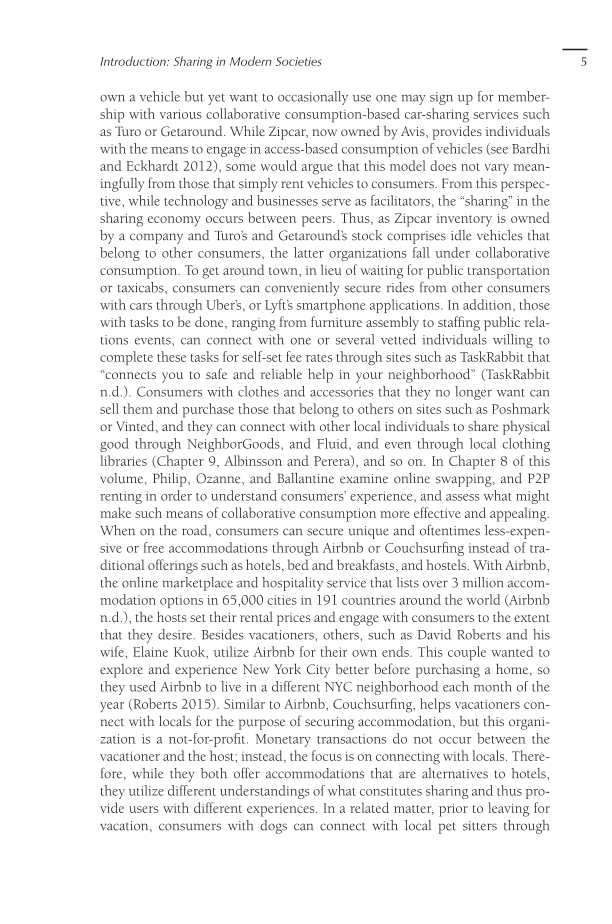Introduction: Sharing in Modern Societies 5
own a vehicle but yet want to occasionally use one may sign up for member-
ship with various collaborative consumption-based car-sharing services such
as Turo or Getaround. While Zipcar, now owned by Avis, provides individuals
with the means to engage in access-based consumption of vehicles (see Bardhi
and Eckhardt 2012), some would argue that this model does not vary mean-
ingfully from those that simply rent vehicles to consumers. From this perspec-
tive, while technology and businesses serve as facilitators, the “sharing” in the
sharing economy occurs between peers. Thus, as Zipcar inventory is owned
by a company and Turo’s and Getaround’s stock comprises idle vehicles that
belong to other consumers, the latter organizations fall under collaborative
consumption. To get around town, in lieu of waiting for public transportation
or taxicabs, consumers can conveniently secure rides from other consumers
with cars through Uber’s, or Lyft’s smartphone applications. In addition, those
with tasks to be done, ranging from furniture assembly to staffing public rela-
tions events, can connect with one or several vetted individuals willing to
complete these tasks for self-set fee rates through sites such as TaskRabbit that
“connects you to safe and reliable help in your neighborhood” (TaskRabbit
n.d.). Consumers with clothes and accessories that they no longer want can
sell them and purchase those that belong to others on sites such as Poshmark
or Vinted, and they can connect with other local individuals to share physical
good through NeighborGoods, and Fluid, and even through local clothing
libraries (Chapter 9, Albinsson and Perera), and so on. In Chapter 8 of this
volume, Philip, Ozanne, and Ballantine examine online swapping, and P2P
renting in order to understand consumers’ experience, and assess what might
make such means of collaborative consumption more effective and appealing.
When on the road, consumers can secure unique and oftentimes less-expen-
sive or free accommodations through Airbnb or Couchsurfing instead of tra-
ditional offerings such as hotels, bed and breakfasts, and hostels. With Airbnb,
the online marketplace and hospitality service that lists over 3 million accom-
modation options in 65,000 cities in 191 countries around the world (Airbnb
n.d.), the hosts set their rental prices and engage with consumers to the extent
that they desire. Besides vacationers, others, such as David Roberts and his
wife, Elaine Kuok, utilize Airbnb for their own ends. This couple wanted to
explore and experience New York City better before purchasing a home, so
they used Airbnb to live in a different NYC neighborhood each month of the
year (Roberts 2015). Similar to Airbnb, Couchsurfing, helps vacationers con-
nect with locals for the purpose of securing accommodation, but this organi-
zation is a not-for-profit. Monetary transactions do not occur between the
vacationer and the host; instead, the focus is on connecting with locals. There-
fore, while they both offer accommodations that are alternatives to hotels,
they utilize different understandings of what constitutes sharing and thus pro-
vide users with different experiences. In a related matter, prior to leaving for
vacation, consumers with dogs can connect with local pet sitters through





























































































































































































































































































































